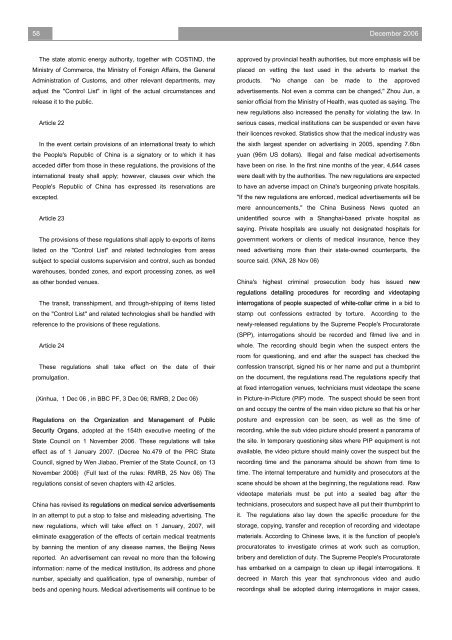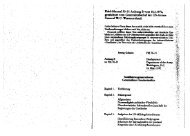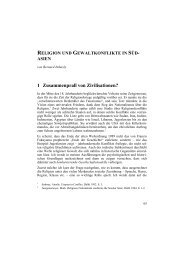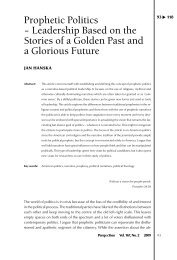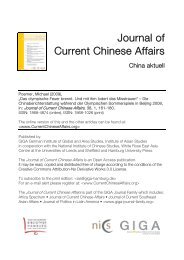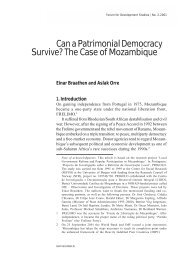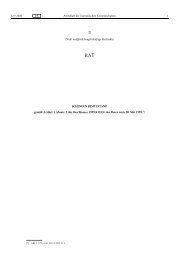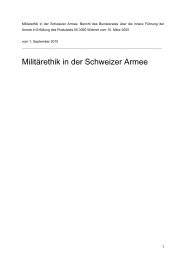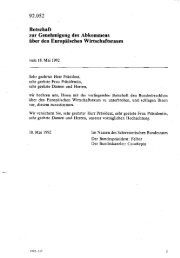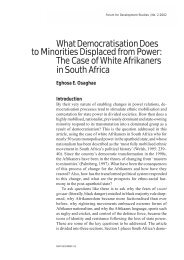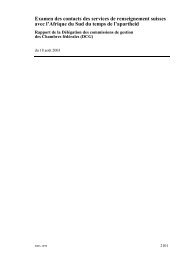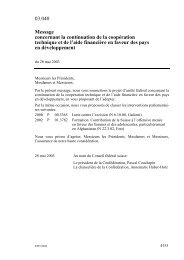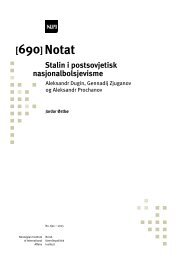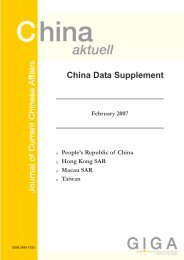China Data Supplement December 2006
China Data Supplement December 2006
China Data Supplement December 2006
Create successful ePaper yourself
Turn your PDF publications into a flip-book with our unique Google optimized e-Paper software.
58 <strong>December</strong> <strong>2006</strong><br />
The state atomic energy authority, together with COSTIND, the<br />
Ministry of Commerce, the Ministry of Foreign Affairs, the General<br />
Administration of Customs, and other relevant departments, may<br />
adjust the "Control List" in light of the actual circumstances and<br />
release it to the public.<br />
Article 22<br />
In the event certain provisions of an international treaty to which<br />
the People's Republic of <strong>China</strong> is a signatory or to which it has<br />
acceded differ from those in these regulations, the provisions of the<br />
international treaty shall apply; however, clauses over which the<br />
People's Republic of <strong>China</strong> has expressed its reservations are<br />
excepted.<br />
Article 23<br />
The provisions of these regulations shall apply to exports of items<br />
listed on the "Control List" and related technologies from areas<br />
subject to special customs supervision and control, such as bonded<br />
warehouses, bonded zones, and export processing zones, as well<br />
as other bonded venues.<br />
The transit, transshipment, and through-shipping of items listed<br />
on the "Control List" and related technologies shall be handled with<br />
reference to the provisions of these regulations.<br />
Article 24<br />
These regulations shall take effect on the date of their<br />
promulgation.<br />
(Xinhua, 1 Dec 06 , in BBC PF, 3 Dec 06; RMRB, 2 Dec 06)<br />
Regulations on the Organization and Management of Public<br />
Security Organs, adopted at the 154th executive meeting of the<br />
State Council on 1 November <strong>2006</strong>. These regulations will take<br />
effect as of 1 January 2007. (Decree No.479 of the PRC State<br />
Council, signed by Wen Jiabao, Premier of the State Council, on 13<br />
November <strong>2006</strong>) (Full text of the rules: RMRB, 25 Nov 06) The<br />
regulations consist of seven chapters with 42 articles.<br />
<strong>China</strong> has revised its regulations on medical service advertisements<br />
in an attempt to put a stop to false and misleading advertising. The<br />
new regulations, which will take effect on 1 January, 2007, will<br />
eliminate exaggeration of the effects of certain medical treatments<br />
by banning the mention of any disease names, the Beijing News<br />
reported. An advertisement can reveal no more than the following<br />
information: name of the medical institution, its address and phone<br />
number, specialty and qualification, type of ownership, number of<br />
beds and opening hours. Medical advertisements will continue to be<br />
approved by provincial health authorities, but more emphasis will be<br />
placed on vetting the text used in the adverts to market the<br />
products. "No change can be made to the approved<br />
advertisements. Not even a comma can be changed," Zhou Jun, a<br />
senior official from the Ministry of Health, was quoted as saying. The<br />
new regulations also increased the penalty for violating the law. In<br />
serious cases, medical institutions can be suspended or even have<br />
their licences revoked. Statistics show that the medical industry was<br />
the sixth largest spender on advertising in 2005, spending 7.6bn<br />
yuan (96m US dollars). Illegal and false medical advertisements<br />
have been on rise. In the first nine months of the year, 4,644 cases<br />
were dealt with by the authorities. The new regulations are expected<br />
to have an adverse impact on <strong>China</strong>'s burgeoning private hospitals.<br />
"If the new regulations are enforced, medical advertisements will be<br />
mere announcements," the <strong>China</strong> Business News quoted an<br />
unidentified source with a Shanghai-based private hospital as<br />
saying. Private hospitals are usually not designated hospitals for<br />
government workers or clients of medical insurance, hence they<br />
need advertising more than their state-owned counterparts, the<br />
source said. (XNA, 28 Nov 06)<br />
<strong>China</strong>'s highest criminal prosecution body has issued new<br />
regulations detailing procedures for recording and videotaping<br />
interrogations of people suspected of white-collar crime in a bid to<br />
stamp out confessions extracted by torture. According to the<br />
newly-released regulations by the Supreme People's Procuratorate<br />
(SPP), interrogations should be recorded and filmed live and in<br />
whole. The recording should begin when the suspect enters the<br />
room for questioning, and end after the suspect has checked the<br />
confession transcript, signed his or her name and put a thumbprint<br />
on the document, the regulations read.The regulations specify that<br />
at fixed interrogation venues, technicians must videotape the scene<br />
in Picture-in-Picture (PIP) mode. The suspect should be seen front<br />
on and occupy the centre of the main video picture so that his or her<br />
posture and expression can be seen, as well as the time of<br />
recording, while the sub video picture should present a panorama of<br />
the site. In temporary questioning sites where PIP equipment is not<br />
available, the video picture should mainly cover the suspect but the<br />
recording time and the panorama should be shown from time to<br />
time. The internal temperature and humidity and prosecutors at the<br />
scene should be shown at the beginning, the regulations read. Raw<br />
videotape materials must be put into a sealed bag after the<br />
technicians, prosecutors and suspect have all put their thumbprint to<br />
it. The regulations also lay down the specific procedure for the<br />
storage, copying, transfer and reception of recording and videotape<br />
materials. According to Chinese laws, it is the function of people's<br />
procuratorates to investigate crimes at work such as corruption,<br />
bribery and dereliction of duty. The Supreme People's Procuratorate<br />
has embarked on a campaign to clean up illegal interrogations. It<br />
decreed in March this year that synchronous video and audio<br />
recordings shall be adopted during interrogations in major cases,


